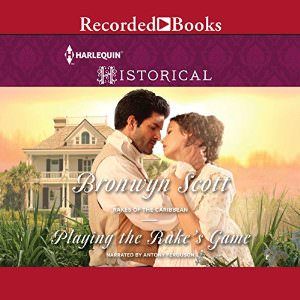 Narrated by Antony Ferguson
Narrated by Antony Ferguson
I’ve read a number of books by this author and have generally enjoyed them, and I selected to review this title because of that, and because the story is set somewhere other than 19th century England. Not that I object to 19th century England as a setting of course, but sometimes I like to immerse myself in a tale set somewhere else, and Playing the Rake’s Game, with its Caribbean location, fit that bill.
Renford Dryden, the Earl of Dartmoor, has recently inherited fifty-one percent of a sugar plantation (Sugarland) on the Caribbean island of Barbados, and is somewhat relieved at the opportunity the bequest offers him to leave England. He hopes that the profits from the plantation will help to shore up the depleted family finances and enable him to provide his sisters with suitable dowries as well as make much needed improvements to his estates. His mother is pressuring him to marry an heiress who has made it clear that all she wants from him is his title, but Ren is unwilling to face the prospect of such a bloodless union, so the news of the inheritance comes at an opportune time.
Ren’s now deceased cousin had been guardian to a young woman by the name of Emma Ward, and he has left her the remaining forty-nine percent of the business. Needless to say, she is not pleased at the prospect of someone she has never met having a controlling interest, or at the fact that he has decided to pay Sugarland a visit. But Emma is sure that she will be able to win over this Mr. Dryden with smiles and flattery and then send him on his way to leave her to get on with running the plantation. She reasons he must be a fairly elderly gentleman if he was a cousin of her guardian, so it shouldn’t be too difficult a matter to persuade him that life in Barbados will be too harsh for him and that he should let her take care of everything and just sit back and enjoy the profits. At home in England.
She is not at all prepared for “Mr. Fifty-One Percent” as she has taken to referring to him, to be young, handsome and – even more problematic – tenacious; and Ren is surprised to find Miss Ward to be beautiful, strong-willed and clearly determined to be rid of him as quickly as possible. Emma treats Ren with thinly veiled hostility and Ren immediately senses that there is something – many things, probably – that Emma is not telling him. On the surface all appears to be going well; the plantation is successful, and the British government’s abolition of slavery has led to better pay and conditions for the workers. But when she fears that Ren is getting close to discovering things she does not want him to know, Emma decides the best thing she can do is to offer him an enticing distraction – in the form of herself. She knows that Ren is desperately attracted to her, and can’t deny that he inspires similar feelings in her, so why not use that to her advantage on both levels? He’s attractive, seductive and if his kisses are anything to go by, knows how to show a woman a good time (!) – and while she’s enjoying all the benefits of having a young, virile male in her bed, she can divert his attention away from the account books.
But Ren isn’t stupid. While he’s certainly not averse to having lots of great sex with Emma, it doesn’t take him long to figure out her ulterior motive, and to – quite naturally – feel just a bit hurt by it. However, there isn’t time for him to nurse his wounded feelings because the other plantation owners on the island are joining forces to try to force him and Emma to join their price-fixing cartel – and will stop at nothing, not even murder, to achieve their ends.
The author has clearly done her homework about what was involved in the business of running a sugar plantation in the 1830s, and I particularly enjoyed the little glimpses she gives of the day to day life on Barbados and her descriptions of the local colour and setting. Ren is an attractive hero, ready to admit that he has much to learn about the business he has inherited and determined to do his best to succeed. Emma is a little abrasive to begin with, but her defensiveness is understandable given that she doesn’t know Ren, she is under a lot of pressure from the “plantocracy” (the other plantation owners) and she believes she is going to have a fight on her hands.
The sexual attraction between the couple is well written and sizzles nicely – Bronwyn Scott’s stories tend to be at the steamier end of the Harlequin Historical line. But the pacing of the book is uneven; the opening, as they meet and begin to size each other up and circle round each other – is well done, but the middle of the book drags somewhat, as Ren and Emma, even though they have become lovers, are still given to mistrust and to navel gazing and wondering about the other’s motives. And while the final showdown between our protagonists and the other plantation owners is quite exciting, the villain of the piece is a bit cartoonish and the ending smacks too much of melodrama for my taste.
Antony Ferguson is someone I’ve listened to in the past, and while his narrations haven’t been outstanding, they’ve been decent, and I’m always prepared to listen to male narrators in historical romance as there are so few of them. His performance here is solid, and he seems to have lost some of the vocal ticks I remember noticing the first couple times I listened to him. His voice is pleasant to the ear, his pacing is good in narrative and dialogue, and he differentiates effectively between all the characters, being particularly good in scenes with feature a number of male characters and ensuring there is no confusion as to who is speaking.
Unfortunately, however, his portrayal of Emma is much less successful. He doesn’t quite resort to falsetto but there’s a falsity to his vocalisation that makes her sound too obviously like a woman being portrayed by a man. That is perhaps an odd observation to make, but it’s the only way I can describe it – and it’s particularly jarring in some of the more intimate and emotional moments. In my review of Mr. Ferguson’s performance in Anna Campbell’s A Rake’s Midnight Kiss, I made mention of the fact that I felt a lack of involvement on his part in the material he was narrating, especially in love scenes; and I can’t deny that I experienced the same feeling of disconnectedness here.
With all that said, I can’t give a wholehearted recommendation to Playing the Rake’s Game, although it does have a decent storyline and an interesting setting. And while Antony Ferguson’s portrayal of the heroine is somewhat sub-par, there are other aspects to his narration which are attractive and easy to listen to. It’s relatively short, coming in at under eight hours, and passed the time agreeably enough, but it’s not an audiobook I’m likely to listen to again.
Caz
Narration: C+
Book Content: C+
Steam Factor: Glad I had my earbuds in
Violence Rating: Minimal
Genre: Historical Romance
Publisher: Recorded Books [jwl-utmce-widget id=32435]




1 thought on “Playing the Rake’s Game by Bronwyn Scott”
Comments are closed.